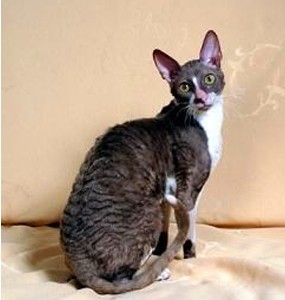History
The Cornish Rex may be a mutant, but he’s also one of the friendliest felines around!
A natural breed and a cousin of the Devon Rex, the Cornish Rex is actually the result of a curious genetic mutation. In the 1950s, a kitten named Kallibunker was born in Cornwall, UK with a strange coat of the curliest, finest hair. Nicknamed “Kalli,” he was the first member of the Cornish Rex breed. Kalli was successfully bred with Siamese, Burmese, British Shorthairs, and others to create a robust, healthy breed known for its outgoing personality.
Similar to the Sphynx, the soft downy coat of the Cornish Rex is a lot more visible and apparent than the down of the Sphynx. Today, the Cornish Rex is one of the most popular cat breeds in America.
Cat Facts
The Cornish Rex is a pretty neat breed, and here’s why:
- The term “Rex” refers to the Cornish’s unusually curly coat. Why Rex, though? The term came into fashion when King Albert I of Belgium entered some curly haired rabbits in a rabbit show. They didn’t meet breed standard, but afraid to anger the king, the judges accepted the rabbits and wrote “Rex” (Latin for king) next to the names of the rabbits on the score sheets.
- The Cornish Rex is known as the Greyhound of the cat world because of his long and lanky profile. And believe it or not, the Cornish loves to play fetch!
- The Cornish’s coat resembles Chenille fabric and is incredibly soft and silky to the touch.
- Weight: 5-10 pounds
What are they like?
There might not be a more outgoing cat than the Cornish Rex. His enthusiasm for life is unmatched, and he loves to be in the middle of everything and absorb attention like a sponge.
The Cornish is smart, acrobatic, and clownish, meaning he loves to play and his hard to outsmart. Able to amuse and entertain himself for hours, he loves to play fetch and has been known to get by without a playmate by tossing his toys with his paws and fetching them himself!
 The Cornish gets along really well with other animals and children, and he is both a great travel companion because of his adaptability and a great therapy cat because he loves to be held and touched.
The Cornish gets along really well with other animals and children, and he is both a great travel companion because of his adaptability and a great therapy cat because he loves to be held and touched.
The Cornish Rex is a very hardy breed of cat with just a few known health issues:
- Hypertrophic cardiomyopathy, a form of heart disease
- Patellar luxation
- Sunburns due to lack of hair
Right for you?
If a Cornish Rex sounds like fun, you’re right! But there are always a few things to consider when welcoming a new pet into your home. Here are some things to consider about the Cornish Rex:
- Yes, the Cornish Rex has a very short, fine coat. But no, the Cornish Rex is NOT hypoallergenic. If you have allergies, these cats can make them worse because they produce dander, or dead skin cells (although no cat breed is better or worse for people with allergies).
- The Cornish Rex’s coat requires very little grooming. In fact, it’s better if you stay away from brushing a Cornish’s coat most of the time, as the fine hairs are delicate and can be damaged. All the Cornish needs is the usual regular nail clippings and, because of the buildup of body oils, occasional paw and ear cleaning.
- The Cornish Rex’s love for attention can make them a bit demanding at times. They don’t like to be alone for long, so if you work long hours or your family isn’t around much, it’s best to get a companion for a Cornish.
- Sunburns! Leaving a Cornish outside for long periods of time can lead to nasty sunburns because of a lack of hair. If you’re looking for a purely outdoor cat, look elsewhere.
If you have any questions or concerns, you should always visit or call your veterinarian – they are your best resource to ensure the health and well-being of your pets.
